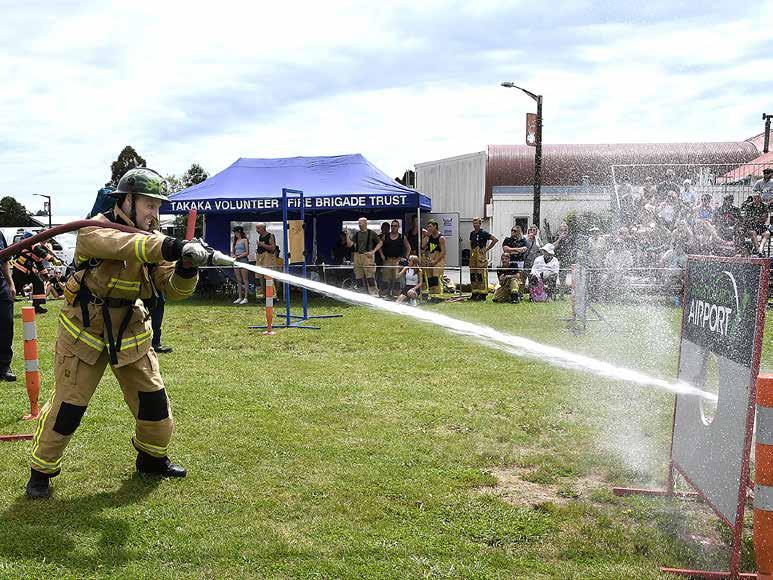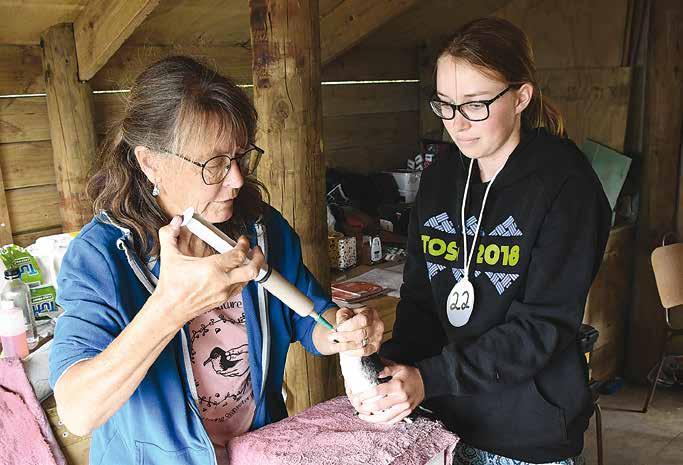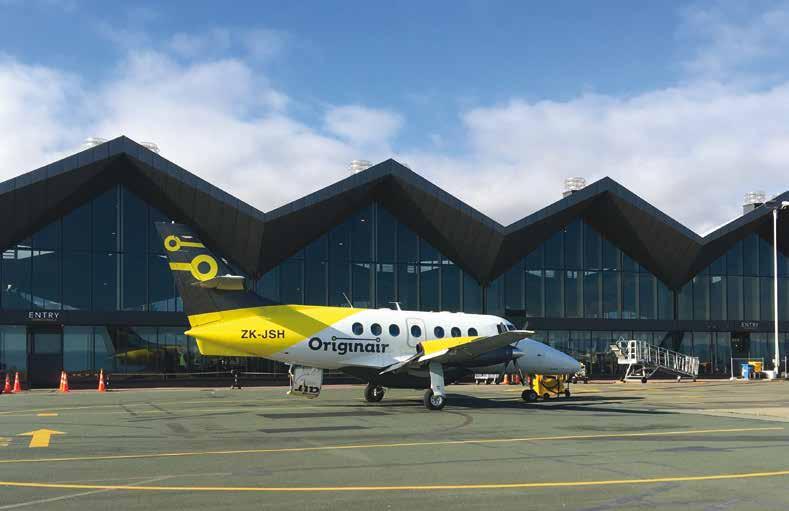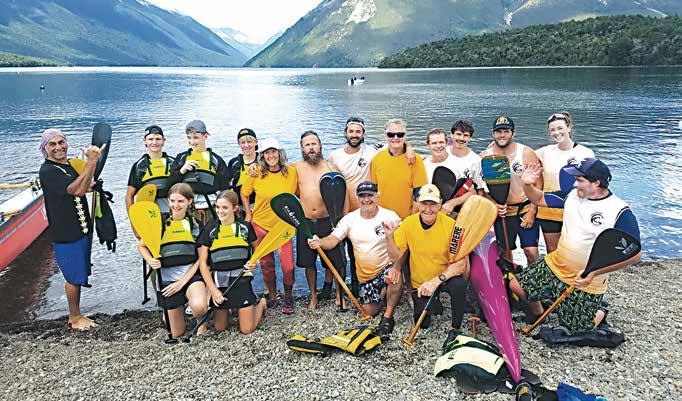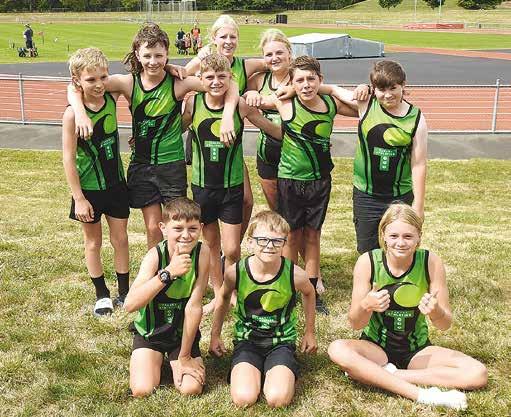
3 minute read
GB Community Board - February

Continued from page
Advertisement
Pedestrian safety at Port Tarakohe “rock arch”: The board will write to port management.
• Port Tarakohe light pollution: The board will make the port management aware of the public concern.
• Glare from Pōhara Hall light: The board will discuss with the Pōhara Hall committee.
• Council update on the ONFL project: The board will request the project leader to provide feedback.
• Menzshed: Board chair Abbie Langford will make a formal submission in response to the public notification.
Presentation
Golden Bay Forest & Bird Update: Chair of Forest & Bird’s Golden Bay branch, Cynthia McConville, provided a brief history of the organisation, which she said was “New Zealand’s largest, longest standing, and most recognised conservation group”. Formed in 1923, Forest & Bird is celebrating its centenary this year and the local branch has a variety of activities planned for the Bay.
Cynthia spoke about a specific project – a memorial forest, which Forest & Bird are seeking to establish in the Bay. She asked the board to help identify a suitable piece of public land on which to locate the forest, estimating that an area of around 1-2ha would be required.
In response to questions from the board, she explained that people would be welcome to plant individual native species in memory of their loved ones or a special event, but it would not be a burial site, natural or otherwise.
Chair’s Report
Progress on, and actions relating to numerous issues raised at previous GBCB meetings or directly with the board members, were reviewed, including:
Herbicide use: Golden Bay RSA had asked TDC for permission to use non-organic herbicides at Memorial Park, in order to control Onehunga weed. A lengthy discussion about the nature of the proposed herbicide, and whether the control would target the weed only or would involve spraying off and reseeding the entire lawn, saw TDC’s Lynne Hall join the meeting to outline the two options. “We can blitz the whole thing and start again, or target Onehunga weed and re-seed patches.”
It was agreed that the use of non-organic herbicides would be allowed, and Lynne would discuss the options for Memorial Park with RSA president Noel Baigent.
Bike stands: Following a request for the installation of bike stands at beach reserves in eastern Golden Bay, seven stands will be distributed at locations selected by TDC staff.
Melia tree on the Village Green: Lynne explained that a decision on the replacement tree was still to be made.
Collingwood disabled parking and temporary speed limit: The parking/painted footpath markings have been fixed. The disabled park has also been installed.
Rubbish collection over holidays: Grant said the rubbish bins in Tākaka were “looking a lot better” this year, but board members noted that bach owners at Tata were using the litter bins to deposit domestic refuse, and something similar was happening at the Tākaka Visitor Centre.
Horses at Pūponga: A Pūponga resident has complained to TDC about Cape Farewell Horse Treks riding across the beach at the reserve, endangering recreational users. TDC environmental assurance group manager Kim Drummond explained that council has no specific rules controlling horses on beaches, and the Department of Conservation (DOC) concession under which the business operates, applies to conservation estate land only.
Abbie agreed to speak to the parties concerned and report back to the board.
Communications workshop: A recent workshop has resulted in a communications plan for the board which includes the use of print media, Facebook, and local radio.
Discretionary Fund applications
A request from the Community Arts and Circus Trust NZ for $1,000 to help fund a fire choreography and performance project was declined, on the basis that a significant proportion of the funding was allocated to employment and was too similar to previous applications.
Golden Bay Riding for the Disabled’s application for $665 to fund a First Aid course for its volunteers was granted.
Abbie said the board should consider holding a workshop to review the criteria for discretionary funding as it was “public money”.
Request for approval of new street name
What was, on the face of it, a straightforward issue, quickly became rather complicated and produced a 30-minute discussion – the longest of the meeting.
It began with Kim’s mea culpa. He explained that he had approved an application to name a new road at Pūponga, thus circumventing TDC’s street naming policy, which delegates the authority to GBCB. He was therefore asking the board to retrospectively approve the name, Bifrost Rise, and tidy up the paperwork. “I gave endorsement to a new name and forgot to get iwi endorsement… so I apologise.”
Although the owner of the subdivision had followed the correct procedure, paid the required fees, and had been informed of the approval by TDC, the board were unhappy about the lack of consultation with Manawhenua ki Mohua. Kim pointed out that Motueka-based iwi were notified in December.
“We asked iwi for a comment, but they didn’t get back to us.”
As the discussion continued, it became clear that no-one at the meeting was sure about the status of the road, but it was most likely to be a public right of way on private land, in which case the owners could name it as they wished with no requirement to seek approval from council.
The discussion ended with the board declining to grant its approval “at this stage” but would seek further clarification from TDC staff about the status of the road, specifically whether it is regarded as a right of way.
Action Sheet
Following a review of the Action Sheet, the board moved into a confidential session from which the public – and the media – were excluded.

